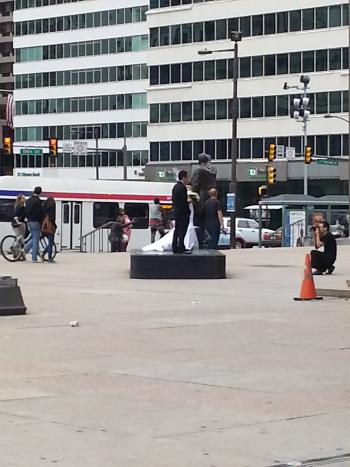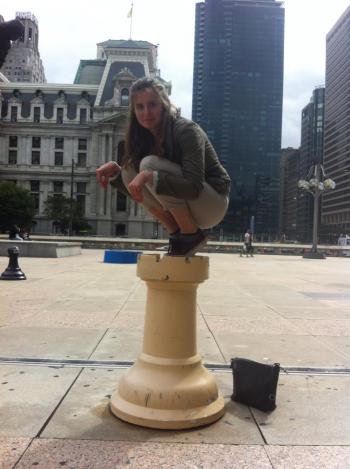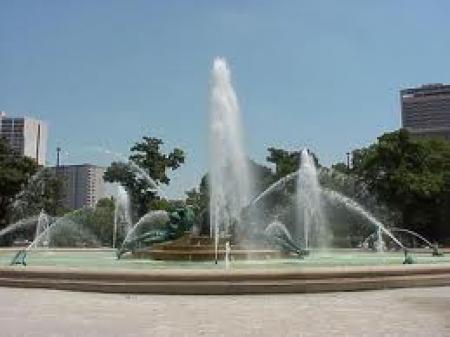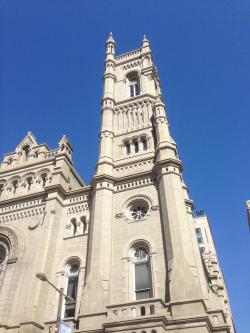Serendip is an independent site partnering with faculty at multiple colleges and universities around the world. Happy exploring!
Blogs

Larger than Life
Philadelphia is quite literally larger than life. All around us on the parkway there were huge, imposing buildings. They were imposing, intimidating, incriminating halls not because of their size but their age. Their echoing chambers filled with the history of centuries, telling the stories of the great heroes long past, all bear down on me. It’s a beautiful and epic place, but the walls themselves seem to demand silence and awe, as if you could somehow destroy the integrity of the place by being anything less than amazed. The eyes of carvings and statues follow us around the rooms and along the sidewalks. Their exaggerated size and features look down upon us as if we must feel privileged to walk down the same paths that others once did. And I do feel awed; I do feel a bit amazed that after all of these years I can be in the same place people once worked and lived hundreds of years ago. But this is what I mean by larger than life. Those giant statues? We can never fill those shoes.
Kinesthetic Dramas
“The Quiet Volume” was fantastic. It was weird, and a little creepy at times. Going in, I only knew that it was about reading, and that it was very participatory. I loved observing the other people in the library, people without a clue that they were part of the performance. My partner, Taylor, was the only other person “in” on it with me. I was brought back to the same meditative state that I had been in earlier. I was open to the experience, letting the feelings that developed wash over me. At first I was peaceful, but as the play progressed, I became more and more unsettled. The increased tempo of the reading and the surround sound really added to the feeling of the play. I liked the strangeness and how the piece challenged not only my concept of what theater is, but how I read. I think art should make you feel something, and some of that might be uncomfortable. It can be upsetting to question ways we do fundamental tasks like reading, but sometimes it can be good.

Weddings and Soul

Philadelphia is a very authentic city, from what I’ve seen of it so far. It has the “soul” keeping it alive that Zukin speaks of. When I’m there, I can feel how many people have been there and have loved it. It gives me hope that one day, I’ll be one of them, living in the city and loving it along with all the ghosts of its past. Zukin says that it is these, the ghosts, that make a city a true city. If that is in fact the case, Philadelphia is one of the truest cities I’ve ever run across.
We explored what felt like every inch of the Benjamin Franklin Parkway, and even a bit beyond. For the amount we saw, we came out at the end of the day feeling like we had spent the whole weekend in the city. My favorite site (or sight?) was the Reading Terminal Market. It was full of people, talking loudly to each other, clearly enjoying themselves as they did their shopping in this bustling indoor market. It was almost overwhelming because of how many people were in there, and how full it was. But when I took a minute to breathe (while moving, I didn’t want to stop in the middle of the traffic!) and look around, I got my bearings. And I loved it.

My first Philly experience
When I was rambling around in Philadelphia, the city was distant to me. I was just a tourist coming to visit, taking pictures and looking at everything through my fresh new eyes. Our role changes every time we visit a new city. In my hometown, I'm the host welcoming the guests. But here, I'm just a visitor waiting for the city to welcome us.
We walked slowly towards the Art Museum, trying to catch on with the surroundings. In the opposite, the city residents walked in a much quicker pace. We saw a lot of runners and bikers exercising on the street all day, ranging from students to the old. People took their dogs out for a walk. The owner of a food cart stretched out his head and said hello to us, hoping that we would buy his food.
We finally reached the museum, with the grand staircases in the front. As we were climbing up the stairs, I heard women shouting and cheering. Soon, a group of young men started racing on the stairs. One of them even took off his shoes and ran in bare feet. I guessed he was the winner at last. They seemed to have a lot of fun in their playing. It was already 11:40 when we reached the top of the stairs. Looking back, the landscape of Philly was right there, as high as I am. I really wanted to go inside the museum or walk around to take a look at the sculptures. But since it's a long way from the library, we had to head back to the Free Library to catch the Quiet Volume Show.

The City of Brotherly Love…
I stepped into the streets, the brisk winds pushing and pulling my hair. Between the cold temperature and the stimuli of the city, I immediately found myself more energized. That was the first thing I noticed when playing in the city.
The second thing I noticed was how thoroughly play was incorporated into the city of Philadelphia. Although the streets definitely gave off a “city” vibe, play was everywhere. This was not the city experience that I was used to.
Serendipity was easy to find in the city. My group and I stumbled upon many things that we did not anticipate or choose. The first of these was a park. It seemed simple enough, until we noticed the giant game pieces scattered around. As we entered, we were shocked by a group of people we saw there, one of whom was climbing up a giant “Sorry” piece, and doing a handstand on top of it. It was amazing to see these people, probably in there twenties, being so open, and really “playing” in the city. This also reinforced my agreement with Henig’s assertion of the great importance of play. Seeing these twenty-something year olds playing with open minds made me so happy. I feel like, much of the time, adults lose (or hide) their desire to play. Seeing these adults play was inspirational and comforting. Who said people all had to “grow up” in the same way or at the same time?

Jiggly Philly

When momma and I stayed in Philly for Admitted Student Day in April, we were taken aback at how the banking district lived side-by-side with streets that almost looked like a ghetto. I told her I was feeling exceedingly pale and female. However by the end of our trip, we concluded that Philly is what it is and we appreciated it. This opinion has not changed. Whilst playing in it with Ellen and Samantha, I found myself looking for run-down establishments and homeless people near the Rodin Museum, as if the scene is incomplete without them. When we were messing around on the giant monopoly pieces near the municipal building, Sam commented on how the city hall does not fit in with the rest of Philly. I agree with her; its majestic white marble put the surrounding skyscrapers to shame.
And yet, these observations support the thesis in my previous paper. Philly is a concentration of American culture. This means that the facets of Philly are not supposed to necessarily compliment each other, but only to coexist silently. For example, I told Ellen that I felt like we were in Paris whilst strolling down the parkway. As soon as we stepped off it onto the Free Library Green, we were back in ‘Murica. Not just anywhere in ‘Murica, but in Washington DC. Washington DC likes to use lots of pillars like the ones at the Free Library; methinks it makes the elites feel more powerful.

Safe
Exploring the city with my little group was awesome and frequently hilarious. We were in a part of the city I had been to but never really had the chance just to see what there is (growing up in a suburb you go to Philadelphia for a day at the Franklin Institute, not for people-watching outside of a pizzeria). Walking around the Parkway and Logan Circle with Thea, Agatha, and Phoenix, I realized a lot of the city’s quirks I had never really thought about before.
Our first stop in Philadelphia was the Rodin sculpture garden where we saw quite a few beautiful pieces of art. The most striking thing for me, however, was how at home I felt. Walking around the garden, looking at the sculptures but focusing more on the plants, I remembered going to Longwood Gardens back in my hometown. I had never really thought I would find something in Philadelphia that reminded me so much of my little town but for the twenty minutes we were in the garden, I was back at home wandering around Longwood.

Segways, Libraries, and Diversity
During the second day of class, the word I chose to describe Mumford’s piece “What is a City?” was “improbable.” Although I liked the concept of a “civic nuclei” (96), in which “social disharmony and conflict [could create] drama” (94), I did not think that such a place could exist. I was aware that many cities have the diversity that allows for “social disharmony.” Yet, I considered it unlikely that people of different ethnicities encounter each other often enough to create it. Instead, I believed that most cities are split into various cultural and/or ethnic neighborhoods, that people are mainly drawn to places that they can personally identify with, and, in consequence, that a whole city could be diverse, but it was not necessarily a melting pot.
However, all of these beliefs were altered during my first trip to Philadelphia. Now, I do not doubt the actuality of “civic-nuclei.” Instead, I believe that they can exist and, when they do, they are integral parts of a city.


The Philadelphia Experiment
Beginning our trip into the city this week, I wasn’t sure if I would be more or less scared to explore the Philadelphia than I have been to explore DC. The train ride was very different from what I’m used to—people actually came to collect my ticket, and there were no turnstiles in sight. That was the biggest tip-off that I was a stranger in this place.
In some ways, that thought put me at ease more than when I go into DC. I didn’t have to worry about tipping anyone off to my status as a “tourist” by openly checking a map, or taking pictures of a landmark. In DC, I’d feel ashamed doing those things, but here, hell, I’d even go so far as to ask someone for directions if I had to. I could approach Philadelphia with more anonymity and curiosity than I could DC by embracing the fact that it wasn’t “my” city.
Getting off the train, my fears were further alleviated. I’d been to this part of the city before with my family members who live in Philly. I remember sitting on the second floor of Mace’s Crossing—a pub overlooking the Circle—on St. Patrick’s Day three years ago, watching off-duty school buses shuttle drunk twenty-something’s along the pub-crawl route. I felt better. I had some knowledge of the area.
So, feeling less anxious and more empowered, we began our trek through the city. In the true spirit of Serendipity, we wandered with no particular destination in mind, ending up at the Philadelphia Museum of Art. Sadly, just after cresting its famous steps, we had to return to the Free Library in order to attend our section of The Quiet Volume.

The first trip

I thought Philadelphia was a modern city with hundreds of high-rise buildings, busy men silently walking in the streets and thick dark clouds. My thoughts are broken when I go up from the Septa station and the first sunlight shines on my hair. Blue sky and clouds are like the Easter egg and its soft white decorative patterns, enwrapping the old but fashionable city.


